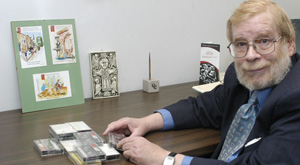Folklore can be defined and understood in countless ways. One definition is that folklore is the common traditions, customs, and material culture of a group. As folkloist William Wilson put it, folklore is the “things people make with words, things they make with their hands, and things they make with their actions.” Folklore consists of songs, jokes, customs, rituals, proverbs, riddles, stories and even popular beliefs.
Folklorists are scholars who formally and academically study folklore and Folkloristics is the study of folklore itself. There are many misconceptions about what folklore is and how it operates in contemporary times. Two of these misconceptions are that folklore is comprised of the traditions of uncivilized, backward, or illiterate people. The other is that folklore is being lost, or fading away due to the civilizing process and passage of time. Alan Dundes, notes folklorist challenged these beliefs in “The Devolutionary Premise in Folklore Theory.” He wrote, “A folk or peasant society is but one example of a ‘folk’ in the folkloristic sense. Any group of people sharing a common linking factor, e.g., an urban group such as a labor union, can and does have folklore. ‘Folk’ is a flexible concept which can refer to a nation as in American folklore or to a single family. The critical issue in defining ‘folk’ is what groups in fact have traditions?”
Arguably, all groups of humans had traditions in the past, and will continue to do so, affirming that folklore is not dying out, but rather changes as humans themselves change. As Dundes notes, “Folklore is universal: there has always been folklore and in all likelihood there will always be folklore.” Given that folklore is not disappearing, but constantly evolving and shifting, it is fascinating and dyn amic to study.
amic to study.
The Southwest Ohio Folklore Archive was donated to the Urban Studies Collection by Edgar Slotkin, professor emeritus of Englsih at the University of Cincinnati. Dr. Slotkin earned his Ph.D. from Harvard University in 1977 and has since contributed extensively to studies of English and Folklore. For more on Dr. Slotkin’s work, see his profile on the UC website.
For over four decades, Dr. Slotkin collected the writings of his students, compiling a unique sampling of folklore from Cincinnati and the surrounding region. This collection is rich and dynamic, featuring everything from proverbs and legends to graffiti and humor. The materials are a major contributioin to understanding the culture and folklore of Greater Cincinnati and will serve as an excellent research tool for folklorists and curious researchers alike.
